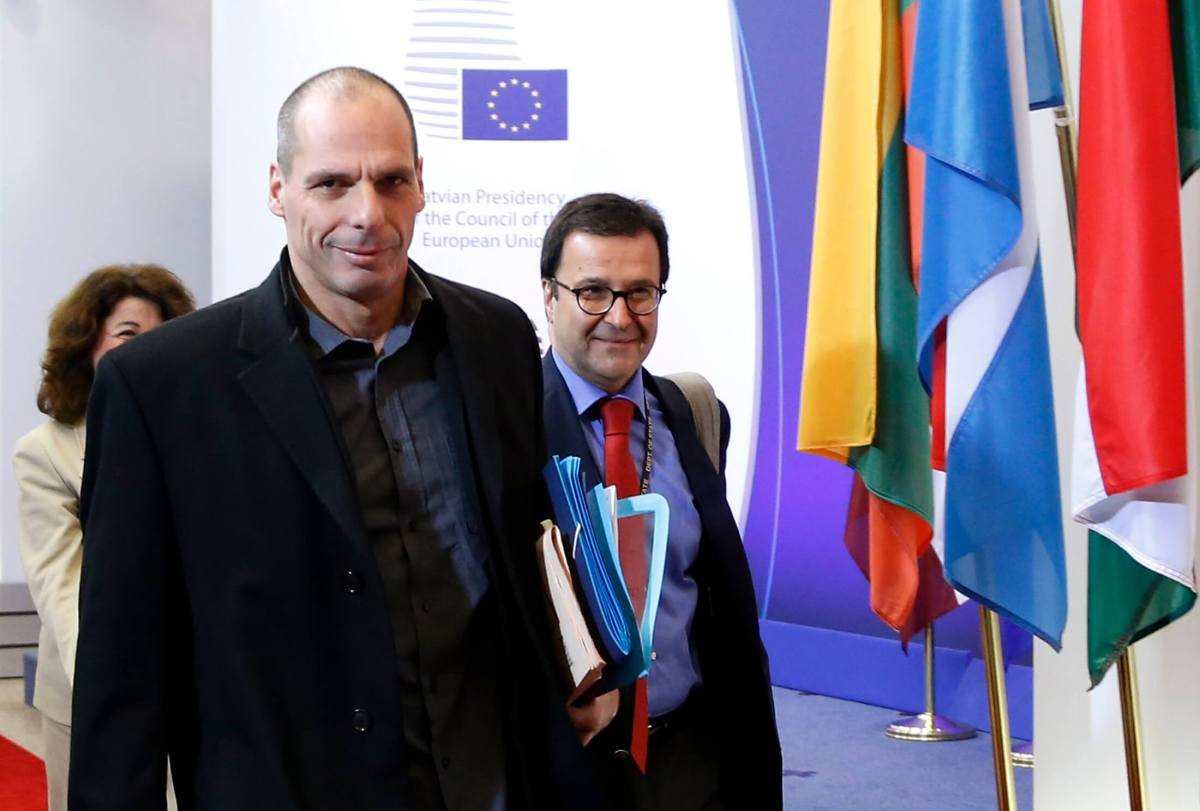Reuters –European Union finance ministers piled pressure on Greece on Tuesday to remain in an international financial rescue program as the euro weakened on fears of disruption when Athens’ credit lines expire in 10 days time. But as he returned to meetings on other, routine, matters with his EU counterparts in Brussels after the collapse of talks on Monday night, Greek Finance Minister Yanis Varoufakis dismissed their argument that his only option is to come back to them and ask to extend a bailout rejected by Greek voters. “The next step is the responsible step,” he said, offering no detail on what Athens was willing to propose. “We will continue to deliberate, in order to enhance the chances and actually achieve a very good outcome for the average European.” Jeroen Dijsselbloem, the Dutch finance minister who chairs the Eurogroup of 19 countries using the common currency, stuck to his guns, however, saying Athens must seek an extension: “It’s really up to the Greeks. We cannot make them or ask them. We stand ready to work with them, also (over) the next couple of days.” Formally, Tuesday’s meeting of ministers from all 28 EU states concerns other matters. But time is short and investors marked down the euro and European shares after Monday’s debacle, some saying the risk of Greece exiting the euro had risen. “The Greek government must shift its position,” Austrian Finance Minister Hans Joerg Schelling said. “Time is pressing.”
Dijsselbloem has said Friday is a deadline for a deal that would give time for some national parliaments to ratify it before the expiry on February 28 of the 240 billion euro credit package that rescued Greece from bankruptcy three years ago. “CRUNCH TIME”
From Britain, the biggest EU state not using the euro, finance minister George Osborne said “we’re reaching crunch time for Greece and the euro zone” and warned failure to reach a deal would be “very severe for economic and financial stability”. Echoing the alarm EU officials have voiced about the negotiating tactics of the left-wing government Greeks elected last month to end hated austerity programs, Osborne added: “What Britain really needs to see is competence, not chaos.” In Greece, however, novice Prime Minister Alexis Tsipras and his team continue to enjoy strong public backing after years of cutbacks demanded by international creditors. Much of the media reported Varoufakis’s angry narrative of events on Monday. The Greek minister said that Dijsselbloem, a close ally of hawkish German Finance Minister Wolfgang Schaeuble, had quashed a proposal from EU economics commissioner Pierre Moscovici, a former French finance minister, that Varoufakis had agreed to. “Yielding to Schaeuble and circumventing Moscovici’s draft, which Athens was ready to sign, the Eurogroup blackmails Greece with an extension,” Greek daily Efimerida Ton Syntakton said. Dijsselbloem dismissed the uproar over drafts leaked by the Greek delegation – one of which they rejected as “absurd”, the other they accepted. He said wordings could be massaged to assuage political sensitivities – Tsipras is committed to ending the current bailout program – but that ultimately Greek must seek funds with strings attached. “All the drafts that have caused such excitement are now on the shelf, and will remain there as long as we don’t agree on the way forward,” Dijsselbloem said, describing Greek demands to be allowed to wind back austerity as too vague at present to let Athens do away with the “protective umbrella” of the bailout. EURO SLIPS
Money is streaming out of Greek banks and Greeks are holding off paying their taxes, adding to pressure on public finances and the banking sector if international money dries up.
Austria’s Schelling said the EU was waiting for figures on cashflows from Greece to make decisions. While insisting he saw no Greek exit from the euro, he echoed EU complaints that Athens may not be taking the situation seriously enough: “We are ready for a dialogue,” he said. “But for that you need a partner who is willing and able to have this dialogue.”
The Greek government says it is others who are deaf to its view that austerity has spread poverty and wrecked its economy.
The euro shed 0.15 percent to $1.1339, dropping from Monday’s high of $1.1429 and back near the bottom of its prevailing $1.1270-1.1534 range.
Investment bank Barclays said the breakdown of talks had raised the risk that Greece would leave the euro zone and raised the prospect that Tsipras would have to call a referendum on whether to accept a deal with strings or ditch the euro. Chris Scicluna of Daiwa Capital Markets said the failure raised the risk of a “disorderly conclusion”. But he added: “All is not lost and we see no need for panic just yet.” The European Central Bank has allowed the Greek central bank to provide emergency lending to the banks, but a failure of the debt talks could mean the imposition of capital controls. The ECB must decide on Wednesday on an extension of special credits.
Fear for Europe’s financial stability as Greece debt deal talks collapse

REUTERS/Francois Lenoir


















